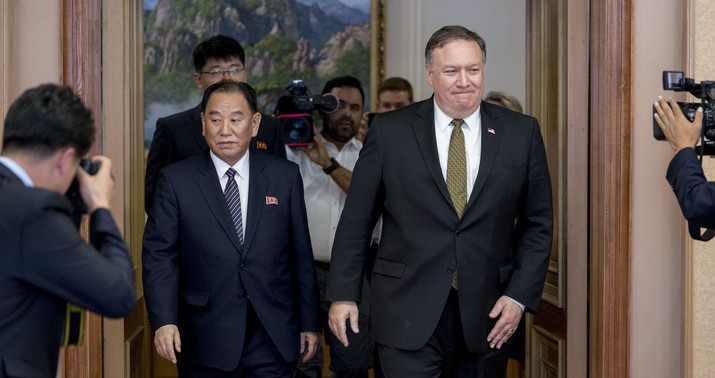Looks like the two sides of the North Korean nuclear crisis have their wires crossed. Secretary of State Mike Pompeo led two days of talks with the Kim regime and offered a positive take on progress as he left Pyongyang. The North Koreans disagreed:
BREAKING: North Korea Foreign Ministry says talks with Pompeo 'regrettable,' accuses US of unilateral demands for denuclearization.
— The Associated Press (@AP) July 7, 2018
North Korea says high-level talks with a U.S. delegation led by Secretary of State Mike Pompeo were “regrettable” and has accused Washington of trying to unilaterally pressure the country into abandoning its nukes.
The statement by an unnamed North Korean Foreign Ministry spokesman on Saturday came hours after Pompeo concluded two days of talks with North Korean officials led by Kim Yong Chol.
The statement says that the United States betrayed the spirit of last month’s summit between President Donald Trump and North Korean leader Kim Jong Un by making unilateral demands on “CVID,” or the complete, verifiable and irreversible denuclearization of North Korea.
It says the outcome of the follow-up talks was “very concerning” because it has led to a “dangerous phase that might rattle our willingness for denuclearization that had been firm.”
Pompeo himself had a different take on the talks, calling them “productive”:
Secretary of State Mike Pompeo wrapped up two days of talks with senior North Korean officials on Saturday without meeting Kim Jong Un but with commitments for new discussions on denuclearization and the repatriation of the remains of American soldiers killed during the Korean War.
Before departing Pyongyang, Pompeo told reporters that his conversations with senior North Korean official Kim Yong Chol had been “productive,” conducted “in good faith” and that “a great deal of progress” had been made in some areas. But he stressed that “there’s still more work to be done” in other areas, much of which would be done by working groups that the two sides have set up to deal with specific issues.
Welcome to the wonderful world of Stalinist diplomacy, Secretary Pompeo! One key in understanding this is that Pompeo didn’t meet with Kim himself this time, a change from previous visits. That’s more or less normal, as diplomatic negotiations would typically take place at the foreign-minister level and below after the ice has been broken initially. But that also leaves the head of state free to disavow anything produced by his team regardless of how “productive” it was from our point of view.
Also, it’s not clear just how seriously to take this. We already knew that the definition of “denuclearization” would be difficult to pin down before these talks even began. North Korea and China want an expansive definition, one in which the US would withdraw its nuclear-force umbrella from South Korea and perhaps even Japan including our submarine-based platforms. From our perspective, we removed our nuclear weapons from the Korean peninsula already, so all of the action needed has to come from Pyongyang. That is likely what prompted the complaints about the “unilateral” focus from Pompeo.
The public complaint might be a real warning that Kim is about to break off contact, but it’s more likely just a test of the resolve of Pompeo and Donald Trump. North Korea knows how to manipulate negotiations, having very successfully done so in the past to win substantial concessions in return for empty promises. We knew this process would involve those attempts too; Pyongyang tried this before the summit and almost wound up with no meeting at all. They’re probing for weakness in the US negotiating team, and between the US and its allies. If we didn’t see a little of this, we might be better off worrying about whether we were giving the store away in negotiations.
We can assume one thing from this reaction — Pompeo and his team really are demanding CVID in these talks. Perhaps our seriousness on that point comes as a surprise to Kim and his team. Still, at least the talks will continue:
Pompeo has come under increasing pressure to produce tangible results from a June 12 summit that President Trump quickly touted as a game-changing moment that eliminated North Korea’s nuclear threat.
But analysts said the reality is now sinking in that any final accord between the two nations to eliminate Pyongyang’s sophisticated nuclear and missile arsenal will be a long slog with no guarantee of success.
“While we were hopeful there would be some sort of breakthrough, it seems both sides agreed to merely keep talking,” said Harry Kazianis, an Asia expert at the Center for the National Interest.
Sinking in? That much was obvious from the start. The divide is both severe and long-standing, and in some ways both sides have to learn how to talk with each other first. Today is part of that learning process. We may or may not succeed in reaching a deal for CVID, but we certainly won’t get to that goal without talking first.
